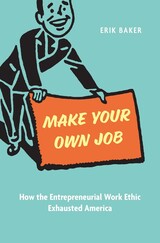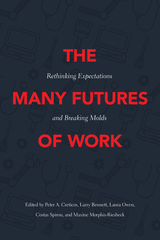
A sweeping new history of the changing meaning of work in the United States, from Horatio Alger to Instagram influencers.
How Americans think about work changed profoundly over the course of the twentieth century. Thrift and persistence came to seem old-fashioned. Successful workers were increasingly expected to show initiative and enthusiasm for change—not just to do their jobs reliably but to create new opportunities for themselves and for others. Our culture of work today is more demanding than ever, even though workers haven't seen commensurate rewards.
Make Your Own Job explains how this entrepreneurial work ethic took hold, from its origins in late nineteenth-century success literature to the gig economy of today, sweeping in strange bedfellows: Marcus Garvey and Henry Ford, Avon ladies and New Age hippies. Business schools and consultants exhorted managers to cultivate the entrepreneurial spirit in their subordinates, while an industry of self-help authors synthesized new ideas from psychology into a vision of work as “self-realization.” Policy experts embraced the new ethic as a remedy for urban and Third World poverty. Every social group and political tendency, it seems, has had its own exemplary entrepreneurs.
Historian Erik Baker argues that the entrepreneurial work ethic has given meaning to work in a world where employment is ever more precarious––and in doing so, has helped legitimize a society of mounting economic insecurity and inequality. From the advent of corporate capitalism in the Gilded Age to the economic stagnation of recent decades, Americans have become accustomed to the reality that today’s job may be gone tomorrow. Where work is hard to find and older nostrums about diligent effort fall flat, the advice to “make your own job” keeps hope alive.

What will work eventually look like? This is the question at the heart of this timely collection. The editors and contributors—a mix of policy experts, academics, and advocates—seek to reframe the typical projections of the “future” of work. They examine the impact of structural racism on work, the loss of family‑sustaining jobs, the new role of gig work, growing economic inequality, barriers to rewarding employment such as age, gender, disability, and immigration status, and the business policies driving these ongoing challenges.
Together the essays present varied and practical insights into both U.S. and global trends, discuss the role of labor activism in furthering economic justice, and examine progressive strategies to improve the experience of work, wages, and the lives of workers. The Many Futures of Work offers a range of viable policies and practices that can promote rewarding employment and steer our course away from low-wage, unstable jobs toward jobs that lead to equitable prosperity and economic inclusion.
READERS
Browse our collection.
PUBLISHERS
See BiblioVault's publisher services.
STUDENT SERVICES
Files for college accessibility offices.
UChicago Accessibility Resources
home | accessibility | search | about | contact us
BiblioVault ® 2001 - 2024
The University of Chicago Press









